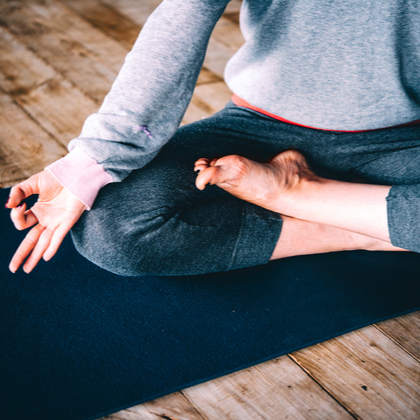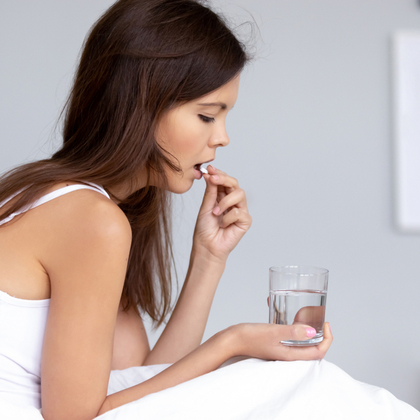
Many factors can affect how well you sleep at night - your diet, how you exercise or even certain lifestyle choices. However, if you’re a woman, you also have to contend with the implications of the menstrual cycle. As we outline below, the hormonal fluctuations that happen just before menstruation may lead to increased difficulties falling asleep, as well as more night-time arousals1.
What happens to your body during your period?
The menstrual cycle can last anywhere between 25 and 35 days. The first day of your bleed is considered the start of your menstrual cycle when oestrogen and progesterone are low. During the follicular phase (days 2-13), oestrogen increases and eventually leads to ovulation (day 14). The post-ovulation luteal phase (days 15-28) is characterised by the rise in progesterone before both hormones drop, and a new cycle begins again with menstruation.
Why can’t I sleep during my period?
The hormonal fluctuations in your luteal phase can lead to a range of emotional and physical changes. For some women, these are mild and subtle. For others, however, these symptoms – collectively referred to as premenstrual syndrome (PMS) – can be bothersome and disruptive.
Although the exact cause of hormonal sleep issues remains unclear, women who experience PMS are twice as likely to struggle with insomnia before and during their period2.

Sleep problems can be even worse for women with premenstrual dysphoric disorder (PMDD), a more severe form of PMS, with 70% complaining of insomnia around menstruation3.
How does PMS affect my sleep quality?
Less REM sleep
Although empirical findings have been inconclusive, some studies report that women who experience PMS have atypical sleep architecture – in other words, they move abnormally through the different stages of the sleep cycle4.
For instance, PMS may affect the quality of rapid eye movement (REM) sleep 5. REM sleep is the deeply restorative stage of the sleep cycle, where dreaming happens, learning is consolidated, and memories are entrenched. It’s also an essential form of overnight therapy and emotional covalence.
Poor quality REM sleep may result in restless, fragmented sleeping patterns, as well as diminished cognitive and emotional wellbeing6.
Decreased melatonin
Evidence suggests PMS may decrease levels of the sleep hormone, melatonin, responsible for regulating the body’s circadian rhythm and sleep-wake cycle, making it harder to fall asleep7.
Mood changes
Low oestrogen and progesterone are commonly known to lead to mood changes, such as increased feelings of sadness, anxiousness, or irritability. These emotional fluctuations can often make sleep feel more elusive8.
Menstrual cramps
Experiencing painful menstrual cramps may further disrupt the quality and quantity of sleep. Some women may find it hard to fall asleep due to the discomfort, while others may rouse during the night from painful abdominal cramps.
Menstrual migraines
The presence of menstrual migraines – which often occur in response to the drop in oestrogen – can delay sleep onset9.
Heavy bleeding
Affecting 14% of women every month, heavy bleeding is also known to impact sleep10. Women with heavy periods may have to get up during the night to change their sanitary protection. They may even have greater anxiety about sleep or potential night-time accidents that could stain their sheets or mattress.
Increased body temperature
After ovulation (day 14), progesterone levels rise and oestrogen fall, which may increase body temperate and fragment sleep as a result11.
How can I stop period insomnia?
Although it’s common to experience insomnia around your period, there are plenty of ways to improve your sleep at this time.
Stay cool
Since your body temperature can increase slightly during your luteal phase, take extra care to ensure your bedroom temperate, around 16-18 degrees, which is optimal for sleeping.
Aside from dressing suitably and using appropriate bedding, you can also trick your body into feeling tired by taking a hot shower or bath before bed. The contrast between your cooler bedroom environment and the hot shower will encourage your body temperature to drop and speed up sleep onset.
Stick to a routine
Like any other period of sleeplessness, make a conscious effort to maintain a healthy bedtime routine. Aim to practice the same rituals every night to help you wind down and prepare your body for rest.
Go to bed and wake up at the same time every night, disconnect from all blue-light-emitting devices at least 90-minutes before bed – which are widely known to disrupt sleep – and ensure your bedroom is a place of quiet and darkness. Ensure that your bed is dedicated to sleep and sex – nothing else.
Get enough light
Paradoxically, preparing for sleep should start as soon as you wake up in the morning. Exposure to morning sunlight is an essential component of our evolutionary heritage; it helps calibrate our 24-hour body clock, otherwise known as the circadian rhythm. Put simply, more morning sun means better sleep at night.
If you have PMDD, you may want to consider light therapy, which uses morning exposure to a bright lamp to help regulate your circadian rhythm. This is especially useful in the darker winter months.
Be careful of caffeine
Caffeine has a reputation for extending sleep latency (the time it takes to fall asleep), reducing total sleep time, diminishing sleep efficiency, and worsening perceived sleep quality12. To support sleep, try to enjoy your caffeine before midday throughout your cycle – but especially during your luteal phase.
Try to relax and unwind
Using a combination of relaxation techniques, such as yoga, deep breathing, journaling, and visualisation, may help you cope with PMS symptoms and relax before sleeping.
Soaking in a relaxing Epsom salt bath offers two benefits in one – preparing your body for rest and easing menstrual cramps.
Additionally, essential oils, like lavender and geranium, may promote a sense of calm and wellbeing. You can sprinkle them on your pillow, use them in an essential oil diffuser, or add them to a warm bath.
Eat for your hormones
Found in bananas, oats, eggs, carrots, and salmon, vitamin B6 is often recommended for women who experience PMS since it contributes to the regulation of hormonal activity13.
Eating foods with plenty of magnesium and iron – all of which can be found in whole grains and green leafy vegetables – may further help in the days leading up to your period.14 Both iron and magnesium contribute to the reduction of tiredness and fatigue, while magnesium contributes to normal psychological function.
Aside from that, nutritionists also suggest a plentiful intake of vitamin D3, calcium, and omega-3 fatty throughout your cycle, especially during your luteal phase.
To plug any gaps in your diet, you may wish to start taking a specialist multivitamin for women that provides a comprehensive spread of all of the keynote nutrients, along with a quality Omega-3 Fish Oil formula. This can be a helpful insurance policy to ensure all of your nutritional bases are covered.
Many women also choose to take Evening Primrose Oil around the time of their period. Evening Primrose Oil is one of the few natural sources of gamma-linolenic acid (GLA), an Omega-6 fatty acid.
Do some gentle movement
Though you may feel less energised in your luteal phase, try to remain active, even if it means moving your body in a slower, gentler way with simpler activities, like yoga, swimming, or walking.
Not only does physical activity help the body prepare and unwind for rest at night, but it also has the added bonus of combating feelings of irritability, sadness, and anxiety that are often associated with PMS.
Invest in a protective mattress pad
If you experience heavy menstrual bleeding and worry about potential night-time accidents, it may be an idea to invest in a mattress pad or protector for peace of mind while sleeping.
Although it can sometimes feel like you have no control over your hormones, rest assured, there are plenty of ways to reclaim agency over your menstrual cycle and support your sleep hygiene.
Of course, if you have any further concerns about your hormonal health and sleep, it’s always worth speaking to your GP.
Enjoyed reading this article? Feel free to browse the rest of our dedicated Sleep Health Hub to learn more about how to get a restful night’s sleep.
References:
- Sharkey KM, Crawford SL, Kim S, Joffe H. (2014) Objective sleep interruption and reproductive hormone dynamics in the menstrual cycle. Sleep Med. 15(6): 688-93.
- Baker FC, Sassoon SA, Kahan T, Palaniappan L, Nicholas CL, Trinder J, Colrain IM. (2012) Perceived poor sleep quality in the absence of polysomnographic sleep disturbance in women with severe premenstrual syndrome. J Sleep Res. 21(5): 535-45.
- 2021. [ONLINE] Available at: https://www.womenshealth.gov/mental-health/good-mental-health/sleep-and-your-health
- InformedHealth.org [Internet]. Cologne, Germany: Institute for Quality and Efficiency in Health Care (IQWiG); 2006-. Heavy periods: Overview. [Updated 2017 May 4].
- Shechter A, Boivin DB. (2010) Sleep, Hormones, and Circadian Rhythms throughout the Menstrual Cycle in Healthy Women and Women with Premenstrual Dysphoric Disorder. Int J Endocrinol. 259345.
- Jehan, S., Auguste, E., Hussain, M., Pandi-Perumal, S. R., Brzezinski, A., Gupta, R., … McFarlane, S. I. (2016). Sleep and Premenstrual Syndrome. Journal of sleep medicine and disorders, 3(5), 1061.
- Jehan, et al. (2016) Sleep and Premenstrual Syndrome, 1061.
- Khazaie, H., Ghadami, M. R., Khaledi-Paveh, B., Chehri, A., & Nasouri, M. (2016). Sleep Quality in University Students with Premenstrual Dysphoric Disorder. Shanghai archives of psychiatry, 28(3), 131–138.
- Mayo Clinic. (2019). Headaches and hormones: What's the connection?. [ONLINE] Available at: https://www.mayoclinic.org/diseases-conditions/chronic-daily-headaches/in-depth/headaches/art-20046729.
- InformedHealth.org [Internet]. Cologne, Germany: Institute for Quality and Efficiency in Health Care (IQWiG); 2006-. Heavy periods: Overview. [Updated 2017 May 4].
- Lee KA, Shaver JF, Giblin EC, Woods NF. (1990) Sleep patterns related to menstrual cycle phase and premenstrual affective symptoms. Sleep. 13(5): 403-9.
- O'Callaghan, F., Muurlink, O., & Reid, N. (2018). Effects of caffeine on sleep quality and daytime functioning. Risk management and healthcare policy, 11, 263–271.
- Fathizadeh, N., Ebrahimi, E., Valiani, M., Tavakoli, N., & Yar, M. H. (2010). Evaluating the effect of magnesium and magnesium plus vitamin B6 supplement on the severity of premenstrual syndrome. Iranian journal of nursing and midwifery research, 15(Suppl 1), 401–405.
- Fathizadeh, N., Ebrahimi, E., Valiani, M., Tavakoli, N., & Yar, M. H. (2010). Evaluating the effect of magnesium and magnesium plus vitamin B6 supplement on the severity of premenstrual syndrome. Iranian journal of nursing and midwifery research, 15(Suppl 1), 401–405.
Related Posts

Olivia
Olivia Salter has always been an avid health nut. After graduating from the University of Bristol, she began working for a nutritional consultancy where she discovered her passion for all things wellness-related. There, she executed much of the company’s content marketing strategy and found her niche in health writing, publishing articles in Women’s Health, Mind Body Green, Thrive and Psychologies.
View More



